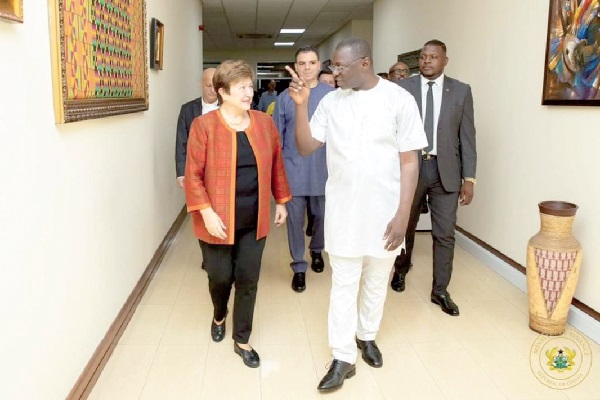
Debt struggles continue despite restructuring — Fitch
Ghana's economy is still faced with significant financing challenges despite the government's debt restructuring activities, a recent report by Fitch has indicated.
As a result, the rating agency kept Ghana's rating at a level that indicates that the country is effectively in default on its foreign debts.
This rating, known as 'RD' or 'Restricted Default', means Ghana has failed to make payments on some of its international loans, specifically its Eurobonds.
The report, however, noted that the country is making efforts to restructure its debts and work with international creditors to improve its financial situation.
At the same time, Fitch gave Ghana a slightly better rating of 'CCC' for its ability to repay debts in its local currency.
This suggests that while Ghana is struggling with its international debts, it is in a somewhat better position to meet its financial obligations within the country.
The report highlights that Ghana is in the process of negotiating with its lenders and making plans to reduce its debt burden, which could help improve its financial health in the future.
Ghana's total debt as of June 2024 stood at GH¢742.0 equivalent to 70.6 per cent of GDP.
DDEP
Ghana's economy is faced with an unsustainable public debt, a situation which prompted the country to seek help from the International Monetary Fund (IMF).
As part of the three-year programme with the fund, the government was tasked to restructure both its domestic and external debt in a move which is expected to bring the debt-to-GDP ratio down to 55% by 2026.
The Domestic Debt Exchange Programme, which was launched in December 2022, saw the government swap old bonds worth about GH¢82 billion for 12 new ones at reduced coupon rates and longer tenors.
The government has since then settled all local individual bondholders who opted out of the DDEP, with payments for local institutional bondholders ongoing.
The Minister of Finance, Dr Mohammed Amin Adam, delivering the mid-year budget also noted that the government had paid about GH¢12 billion to bondholders who participated in the DDEP, demonstrating its commitment to the programme.
He said the government has so far honoured two coupon payments, with the third payment of GH¢6.1 billion scheduled for August this year. It is against this background that Fitch gave the country an improved rating on its ability to repay domestic debts.
External debt
On the external side, the government recently reached an MoU with the Official Bilateral Committee to restructure bilateral debts of about $5.1 billion.
The country is still waiting for the individual countries to formalise the agreements. On the commercial side, the country has reached an agreement with the Eurobond holder committee to restructure bonds of about $13 billion. The deal will see investors take a 37% haircut on their principal and suspension of coupon payments until 2026.
The debt cancellation involved is $4.7 billion and debt service savings from 2023 to 2026 is $4.4 billion.
The government is expected to later this month launch a consent solicitation and exchange of memorandum on the international capital market. This move will allow the government to request the consent of Eurobond investors to amend the original terms of the bonds.
There are currently two new bonds on offer; the PAR bond and the DISCO bond. The PAR bond has a limit of $1.6 billion, while investors who consent to the DISCO bond will have three new instruments (Bond short, Bond long and Down Payment Bond) to choose from. Any consenting holder under both options will receive a PDI Bond and a consent fee.
Fitch said it expected the consent solicitation to be launched imminently and the Eurobond exchange to be settled by September 2024, although there could still be some delays due to ongoing negotiations on the restructuring terms of the International Development Association (IDA)-partially guaranteed bond.
"We expect completion of the external debt restructuring by end-2024," Fitch noted.
Eurobond repayment
Fitch indicated that the affirmation of the LTFC IDR at 'RD' reflects that Ghana was still defaulting on its outstanding Eurobonds following the expiration of the grace period for a missed coupon payment in February 2023.
At the recent Monetary Policy Committee press briefing, the Governor of the Bank of Ghana, Dr Ernest Addison confirmed that the country had enough reserves to honour its debt repayment obligations to Eurobond holders in the second half of the year.
Although Ghana's negotiations with Eurobond holders have led to the suspension of coupon payments until 2026, the country is expected to make some bullet payments on the principal debt. According to IC Africa Research, Ghana is expected to make debt service payments between $600m and $800m this year.
About $478 million of this amount is expected to be paid to Eurobond holders who the country recently concluded a debt restructuring deal with. "We are very much aware of the upcoming payments, if you look at the cash flow projections, you would see that provisions have been made for this particular payment."
So yes, we have built up reserves to meet some of these lumpy payments in the outlook," Dr Addison said.
Ghana's gross international reserves improved in the first half of the year to $6.86 billion from the $5.34 billion recorded in the same period in 2023.